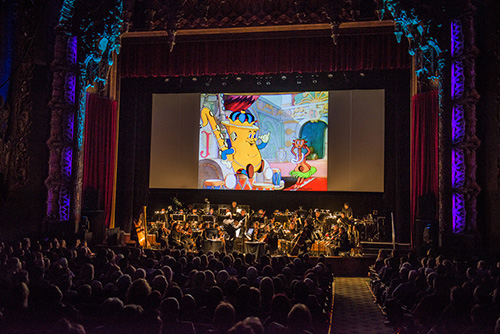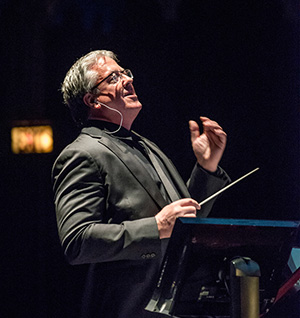

  |
|
|
||||||||||||||||||||||
|
FMS FEATURE... June 15, 2015 Los Angeles Chamber Orchestra Celebrates Walt Disney Animation Mark Watters conducts classic toons live-to-picture for sold-out fundraiser at historic movie palace by Jon Burlingame  Los Angeles Chamber Orchestra Emmy-winning composer Mark Watters conducted the 33-member ensemble in scores for nine cartoons spanning nearly 90 years of classic Disney animation. The sold-out event drew 1,600 people, many of whom were wowed not only by the music but by the setting itself, a restored 1927 movie palace (originally the United Artists Theatre) with its ornate Spanish Gothic interior and vaulted ceiling. The concert opened with two rarely screened "Oswald the Lucky Rabbit" shorts, early Disney cartoons that preceded the creation of Mickey Mouse: Proud Papa (1927) and Africa Before Dark (1928). Watters composed a new score for each, drawing on familiar songs and classical works while remaining tightly synchronized with the images. The "Oswald" shorts were exceptionally clever and outrageous even by modern standards. In Proud Papa, Oswald the dad is beset by the delivery of dozens of baby rabbits that he must care for and monitor. When a battalion of storks arrives to drop hundreds more down Oswald's chimney, the orchestra heralds them with Wagner's "Ride of the Valkyries," amplifying the gag. The crowd roared with laughter. The earliest Mickey Mouse short played was Plane Crazy (1929), with its original Carl Stalling score (reconstructed by Disney music historian Alex Rannie). Stalling – who years later would become Warner Bros.' top cartoon composer – was a genius in interpolating popular songs of the era in his scores, heightening the humor and even adding jokes of his own. In Plane Crazy the tunes included everything from "Hail to the Chief" to "Rock-a-bye Baby." The first half concluded on a high note: Music Land (1935), part of Disney's Silly Symphony series, a retelling of "Romeo and Juliet" in which one family is classical (from the "Land of Symphony"), the other popular (the "Isle of Jazz"), and all of the characters are musical instruments. The prince is a saxophone, the princess a violin (and the King of the Isle of Jazz bears more than a passing resemblance to bandleader Paul Whiteman, then known as the "King of Jazz"). Leigh Harline's score brilliantly counterpoints one musical genre with the other. But the original score was recorded in bits and pieces, and had not previously been performed live. (Considering the complexity and tempo of the music, skeptics would be forgiven if they declared it impossible to play from start to finish.) Watters adapted the Harline score for live performance, stretching the Chamber Orchestra to its limits in the wacky sounds necessary (including the various instruments "talking" to each other) and the sheer energy required by every musician. The second half opened with another classic, The Band Concert (1935), the first color Mickey Mouse short. Mickey conducts his pals in the "William Tell Overture" while Donald Duck irritates by playing "Turkey in the Straw" on one of a seemingly endless supply of flutes; eventually a tornado sweeps them all up for a wild finish. This, again, was a Harline score (mostly based on the 19th-century Rossini opera) whose performance drew cheers from the appreciative audience.  Mark Watters The final two works were animation masterpieces created by Disney artists 75 years apart: The Sorcerer's Apprentice (produced in 1938 and first seen in Fantasia, 1940) and the Oscar-nominated short Get a Horse! (2013). Watters adapted the Leopold Stokowski version of Paul Dukas' 1897 symphonic poem for LACO's smaller ensemble without losing the momentum or power of the original. Watters then conducted his own original score for the inventive and witty Get a Horse! in which Mickey and Minnie are beset by, and ultimately triumph over, Peg Leg Pete in hand-drawn black-and-white cartoonery woven in and out of computer-generated color animation. Conductor and musicians got a standing ovation at its conclusion. Dave Bossert, producer and creative director at Walt Disney Animation Studios, and Edward Nowak, senior vice president and deputy general counsel for the Walt Disney Company, served as hosts. ©2015 Jon Burlingame |
Search
Past Features
Feature Archives
|